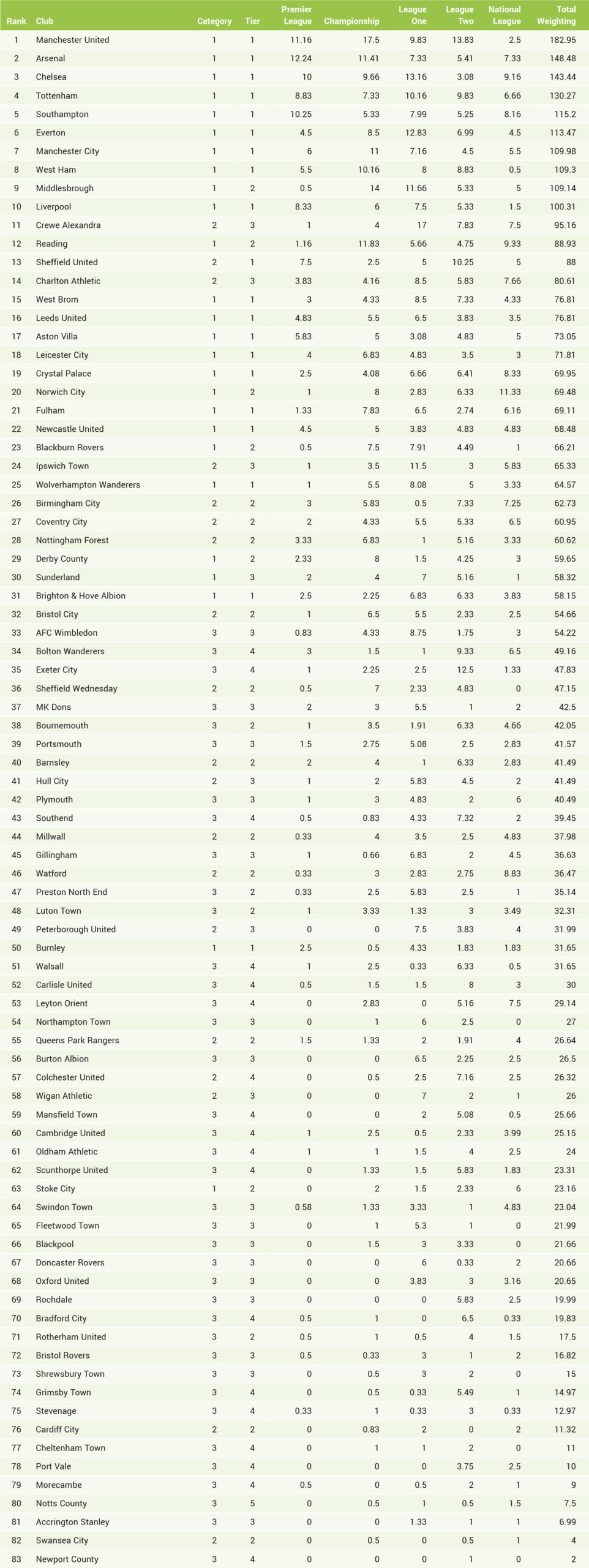
Academy Productivity Rankings 2020/21: Manchester United top for third time in a row
Written by
Josh Schneider-Weiler
December 7, 2021
Manchester United have topped Training Ground Guru’s Academy Productivity Rankings for the third consecutive edition.
This is the only publicly-available resource of its kind and was started by Mark Crane in 2016/17 after he became frustrated at the lack of information he could find about Academy productivity when trying to find a club for his son.
After a three-season hiatus, the rankings are now back. All Academies from Categories One to Three have been ranked according to the number of their England-eligible players who made at least one league appearance in 2020/21 (scroll down for the methodology).
Points are weighted according to the level an Academy graduate played at last season (from Premier League to National League) and in cases in which they attended more than one Academy (which is common), the points are split between the clubs.
Once again, the top 10 clubs in the rankings are Category One, with Manchester United top by 34 points. Arsenal are again second, while Chelsea have leapfrogged Tottenham into third place. Southampton have risen two places from 2017/18 into fifth, as have Everton into sixth. Manchester City have gone up four places to seventh.
Middlesbrough, in ninth, are the only side in the top 10 from outside of the Premier League, while League One Crewe are the highest-ranked Category Two side, in 11th. Reading are 12th and produced the third highest number of Championship players (after Manchester United and Middlesbrough).
In fact, if we look purely at the number of graduates produced by each Academy, without weighting, then Reading would be joint eighth, ahead of Liverpool and West Ham.
Charlton Athletic, also Category Two, are another club worthy of mention, having placed 14th (they were 13th in 2017/18 and seventh in 2016/17). AFC Wimbledon, in 33rd place, are the top Category Three team – above Category One outfit Burnley. Bolton, also Category Three, were one place behind them in 34th.
Manchester United had the joint-most graduates overall, along with Arsenal – a total of 69 – but they had 19% more players who had played in the Premier League and Championship, which is why they are clear at the top.
Nick Cox, Manchester United’s Head of Academy, told TGG: “Ultimately, the majority of boys who engage with us do so because they have a dream of making a debut. Knowing we’re supporting them to achieve this aim on a consistent basis is an amazing achievement for our staff.
“Productivity is really important for our Academy as a world-leading youth development system. Like any school, we want to know that at the end of the journey there are some results. Debuts are the equivalent of our exam results.”
However, Cox added: “Productivity is only one measure of success for an Academy. Yes, it’s a central pillar of everything we do but it’s not our sole measure. Also, we have to consider that for some clubs the stats might not exactly reflect the work they are doing, because different organisations have different contexts as to what they’re trying to achieve and where they are on their journey.”
It’s important to recognise that the rankings are judging the historic effectiveness of an Academy, because clubs gain points for any England-qualified players who participated in a league game in 2020/21.So, for example, Aston Villa received points because Gary Cahill was at their Academy from 2000 to 2004, so more than 15 years ago.
Because of this, I also compiled a table ranking clubs according to the number of England-qualified players they produced aged 23 and younger in 2020/21, to more effectively evaluate the last decade.
With this filter applied, the results were considerably different. Now Manchester City are fourth, which reflects the progress their Academy has made in the last decade. Everton are fifth, West Brom ninth and Fulham 10th, while Liverpool (11th) and Southampton (12th) fail to make the top 10.
Only included Category One, Two and Three clubs are included in these rankings, but two clubs outside of these classifications are worthy of mention – namely Huddersfield Town and Brentford.
Huddersfield dropped from Category Two to Four in 2017, meaning they now only run teams from Under-18s. The reason cited was a lack of return on investment. The Terriers would have placed 19th in our rankings – up from 33rd in 2016/17 – with a score of 71.81 (with 11 of their graduates having played in the Championship in 2020/21.
Brentford, who dropped out Category Four to Two in 2016, would have ranked 59th.
Methodology
Josh Schneider-Weiler: For this year’s rankings I followed the same methodology used by Mark Crane for his previous editions.
A list was compiled of male English players (ie players eligible in the 2020/21 season to play for the England men’s national team) who played in at least one match for any team in the top five English leagues, based on data from the www.fbref.com website.
Information on the Academy, or Academies, attended by each English player who had made at least one league appearance was then collated and cross-referenced from information in Wikipedia, club biographies, news sources and www.transfermarkt.co.uk
An Academy, Centre of Excellence, or other club training structure was counted as having contributed to a player’s development if he was in attendance there at any point up to the age of 18.
There are players who may have been produced by these Academies who for various reasons may not be included in the research. Players who are not listed as English on www.fbref.com were not included. So players like Wilfried Zaha, who was developed by Crystal Palace but is listed as from the Ivory Coast, were excluded.
Furthermore, Welsh teams like Swansea and Cardiff City suffered tremendously in these rankings as most of their graduates are Welsh and not English. Players who were signed or on loan in other countries did not count towards the rankings either.

2020/21 Academy Productivity Rankings table
This article is for TGG Members
To view this full article you need to be a TGG Member. Join up today and also get full access to:
- Masterclasses & Online Conferences
- Full Academy Productivity Rankings & analysis
- Club Directory with 96 clubs & 1,000+ staff profiles
- Personal Profile Builder to showcase yourself
- TGG Live 2024 & 2025 presentations
- In-depth & added-value Articles
